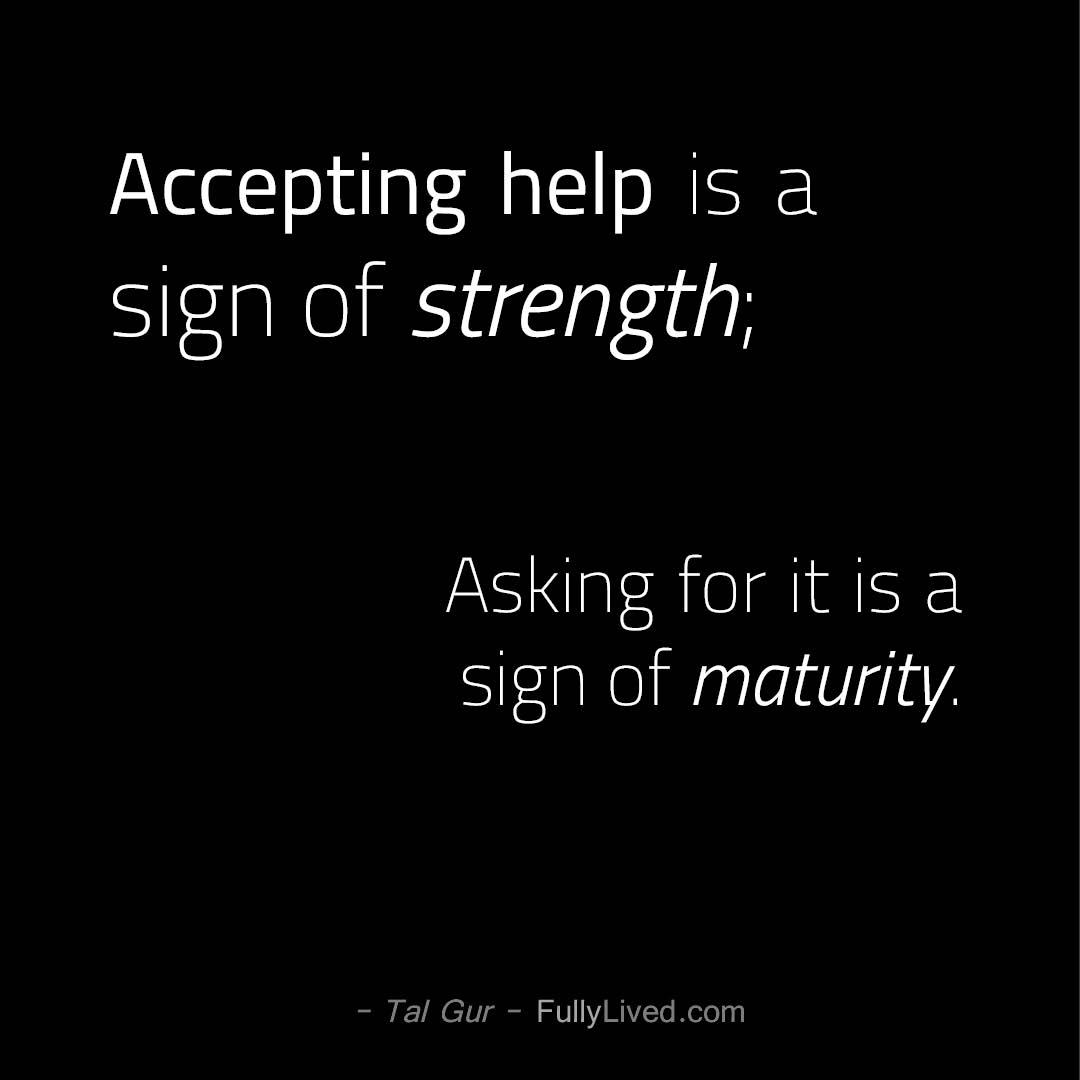Accepting help is a sign of strength; Asking for it is a sign of maturity.
In life, there's this subtle dance between independence and interdependence, where we strive to stand tall on our own two feet, yet find solace and growth in the support of others. It's a delicate balance, often misunderstood, but profoundly crucial in navigating the labyrinth of existence.
Imagine yourself as a lone tree in a vast forest, sturdy and resilient against the winds of life. You stand tall, your roots delving deep into the earth, drawing sustenance and strength. Yet, even the mightiest of trees sometimes bend under the force of a storm. In those moments, it's not weakness to sway or seek support from neighboring trees. Rather, it's a testament to your wisdom, acknowledging that while you're strong, you're not invincible. Accepting help in such times isn't a surrender; it's an affirmation of your resilience and a recognition of the interconnectedness of life.
But here's the subtle twist: there's a difference between accepting help and actively seeking it. Picture yourself lost in a dense forest, unsure of which path to take. You could stumble around aimlessly, letting pride obscure your vision, or you could muster the courage to ask for directions. Asking for help isn't a display of weakness; it's a manifestation of maturity. It's acknowledging that none of us has all the answers, and there's no shame in seeking guidance when we're at a crossroads.
Think of it like learning to ride a bike. Initially, you might wobble and fall, relying on training wheels or the guiding hand of a parent. But as you grow, you gain the confidence to pedal on your own. However, even seasoned cyclists sometimes encounter steep hills or unfamiliar terrain where a helping hand is appreciated. In those moments, asking for assistance isn't a regression to your novice days; it's an acknowledgment of the challenges beyond your current capabilities.
Life often presents us with hurdles too high to leap over alone. Whether it's navigating a career change, coping with loss, or overcoming personal struggles, there's strength in recognizing when we need support. It's not a sign of inadequacy but rather a testament to our humanity. Just as a single thread may seem fragile, yet when woven with others, forms a tapestry of resilience, so too does seeking support weave the fabric of our growth and resilience.
Yet, the journey towards embracing help isn't always smooth. Society often extols the virtues of self-sufficiency, portraying vulnerability as a flaw rather than a facet of our shared humanity. It takes courage to defy these societal norms, to break free from the shackles of pride, and embrace the vulnerability that comes with asking for help. But in doing so, we discover the profound strength that lies in our willingness to be open, to connect, and to grow together.
So, as you navigate the twists and turns of life's labyrinth, remember this: accepting help is not a sign of weakness, but of strength; asking for it is not a sign of immaturity, but of maturity. It's a recognition of our interconnectedness, a celebration of our resilience, and a testament to the beauty of the human experience.
Now, reflect on a recent challenge you faced. Did you try to go it alone, or did you reach out for support? How might embracing help have changed the outcome?
* If you’re seeking extra motivation and inspiration on your journey of personal growth, I recommend taking a look at my SMART growth goals page, This page offers thousands of goal ideas that can assist in the establishment of new aspirations and the attainment of greater heights in one's life. In fact, it was instrumental in my creation of a list of 100 goals, which I pursued for a decade.
Chief Editor
 Tal Gur is an author, founder, and impact-driven entrepreneur at heart. After trading his daily grind for a life of his own daring design, he spent a decade pursuing 100 major life goals around the globe. His journey and most recent book, The Art of Fully Living, has led him to found Elevate Society.
Tal Gur is an author, founder, and impact-driven entrepreneur at heart. After trading his daily grind for a life of his own daring design, he spent a decade pursuing 100 major life goals around the globe. His journey and most recent book, The Art of Fully Living, has led him to found Elevate Society.




















